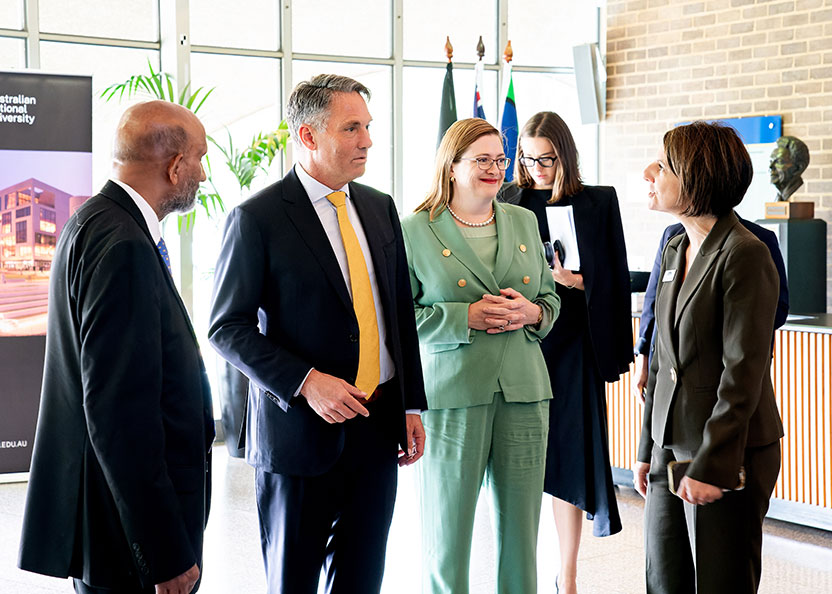
On Tuesday 14 November, the Academy was pleased to convene thought leaders from science research, industry, defence, and foreign affairs, to discuss how national security concerns can be addressed while enabling the benefits that open scientific collaboration offers Australia and the world.
The symposium kicked off with a dinner the night before at the National Gallery of Australia in Canberra. Her Excellency Ms Caroline Kennedy, Ambassador of the United States of America to Australia, gave opening remarks at the event, highlighting the special relationship between researchers in the US and Australia.
“Thanks to the generational opportunity presented by AUKUS, our societies now have the chance to catapult to the forefront of advanced capabilities—AI, quantum and cyber. Just like the moonshot spurred scientific and technological advances—like GPS, water purification, and heart monitors 60 years ago—these new fields will also produce innovations that benefit people in their everyday lives and inspire new generations to get involved in science and to dream and create,” Ms Kennedy said.
“Striking the right balance between collaborative research and national security is one of the most important and difficult goals of democratic societies like the US and Australia… we need to be clear-eyed about the risks of openness and the intent of our competitors.”
Thank you to everyone who attended our 2023 #AcademySymposium. We will be making the recording available for all in one month's time.
— Australian Academy of Science (@Science_Academy) November 15, 2023
Right now, you can watch the video recap of our dinner featuring Ms @CarolineKennedy and Dr Kevin Rudd AC (@MrKRudd): pic.twitter.com/qB7dUY8vdw
Peter Hartcher, political and international editor of The Sydney Morning Herald and The Age, spoke with Australian Ambassador to the United States of America His Excellency the Hon Dr Kevin Rudd AC in Washington DC ahead of the dinner.
The Hon Dr Rudd said there have been significant diplomatic efforts on both sides of the US–China relationship, and that Australia was similarly looking to stabilise its relationship with China following a turbulent few years.
But he said the scope for scientific collaborations may vary greatly between fields of science.
In a panel discussion between Academy President, Professor Chennupati Jagadish AC, and Academy Chief Executive, Anna-Maria Arabia, moderated by Peter Hartcher, Ms Arabia elaborated on the draft Defence Trade Controls Amendment Bill 2023.
“What has come into stark reality is that the very architecture of the research system is likely to transform,” Ms Arabia said.
Read this article on the Academy website for more information about the event.
The symposium took place on the following Tuesday at the Shine Dome in Canberra, with the keynote address by Professor Jagadish.
“There are local challenges which each country’s scientists will need to work to seek to solve, but the global challenges are different: bigger, harder and more complex, and political. They require global solutions, and that will require researchers and peoples to work together,” he said.
The day included addresses by Assistant Minister for Foreign Affairs the Hon Tim Watts MP, Deputy Secretary National Security and Resilience Nathan Smyth, and Deputy Prime Minister the Hon Richard Marles MP, in conversation with Chief Defence Scientist Professor Tanya Monro AC.
Deputy Prime Minister Marles believed that Australia needs to change our cultural relationship with science—to see it front and centre and crucial to responding to issues our country faces, such as the lack of economic diversification in the Australian economy.
Great to speak with Chief Defence Scientist, Tanya Monro and Australia’s leading scientists at the Australian Academy of Science Symposium. We discussed the importance of scientific research in addressing national security challenges. pic.twitter.com/6PpUMufROp
— Richard Marles (@RichardMarlesMP) November 15, 2023
The panel discussions explored the two-way responsibility for engagement between government and scientists, the benefits and concerns of the proposed Defence Trade Controls Amendment Bill 2023, current approaches to the management of national security risks associated with research collaboration in Australia and overseas, and whether current constraints on international engagement will impact the ability of science and technology to help solve global challenges.
“I am confident this symposium has improved our mutual understanding of the research and national security challenges we face,” Professor Jagadish said in his closing remarks.
“It is my view that the Learned Academies need to play a role in helping the government communicate and build an understanding of the requirements and responsibilities that will increasingly be placed upon scientists, and importantly, where they will not.”
A more detailed summary of the evening is captured in event co-convenor Professor Steven Chown’s summary remarks of the event.
More post-event information can be found on the Academy website.


© 2024 Australian Academy of Science